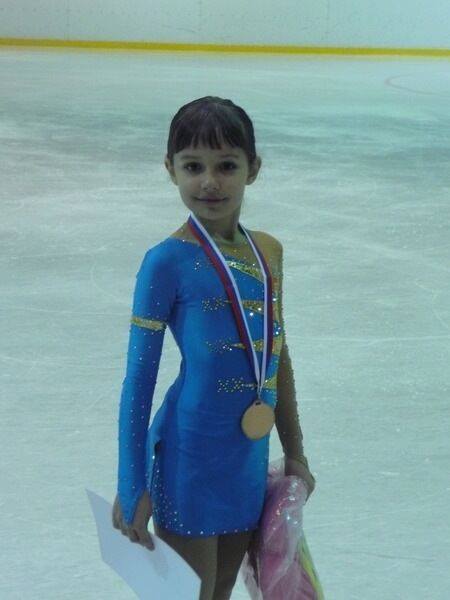Hockey is a universal language, especially for Margarita Dorofeeva, a first-year forward at St. Thomas University.
Originally from Zelenograd, a city in Moscow, Russia, she moved to Canada in 2012 to pursue her education, as well as her love for hockey. Despite being completely unfamiliar with English, hockey was a language she didn’t need to learn.
For her, hockey became a passion at the age of seven. Dorofeeva started figure skating at the age of three, but she didn’t like it, and wanted to try a team sport. Hockey seemed to be the right fit. At seven, she juggled both sports for one year, but her hockey coach said she had to pick one.

Ultimately, she dropped her figure skates for hockey skates.
“It was [an] easy decision, I hated figure skating,” said Dorofeeva.
“I guess it was hard for my parents to let me [make] the choice that I [wanted] because figure skating is big in Russia whereas women’s hockey [is] not as big. I guess I’m glad they believe in me.”
Dorofeeva says that all girls’ hockey teams weren’t very prominent in Russia, so she played defence on a team with boys, called Orbita. She was the only girl on the team, but she held her own. She was two years older than the rest of her teammates and was much bigger than them. They were all very respectful of her, and had good friendships with her — and continue to. Once the boys grew bigger, she switched to forward. She attended grammar school number 1528 until she was done Grade Seven, then she was ready for a change.
“If you play sports, you’re most likely going to end up playing sports your whole life,” she said.
“And if you’re really good at school, you’re most likely going to [not be] playing sports. So that [was] a big decision for my parents because I [wanted] to do both.”
Her parents went to the company 4Sports and they searched for a school for her to attend in Canada. They chose King’s-Edgehill in Windsor, Nova Scotia. At 13, she headed to the private school, alone. But she made sure to head back to her hometown every summer to be with her family.
When she arrived, she didn’t know any English, but she was forced to learn since nobody around her knew Russian. However, Dorofeeva said that her teachers and peers were extremely helpful, and made it easier to understand by using hand gestures.
“There were no major adjustments. It was a relaxed atmosphere, so it wasn’t hard at all,” she says.
She did say she noticed small cultural differences when she moved.
“How school works, like how people communicate … food culture, for sure, is different.”
But it wasn’t a major culture shock overall.
She continued playing as a forward and was on the ice until she graduated.
Peter Murphy, STU’s women’s hockey coach, contacted Dorofeeva’s coach at King’s-Edgehill in her senior year. He wanted her to come visit the campus and see what the team was all about. She agreed and travelled to Fredericton with her coach in February.
When she arrived, she met Paige Jackson, a player on the hockey team, who welcomed her immediately. She watched the women’s team play against Saint Mary’s University and she was sold.
After visiting other universities in the States and Toronto, her last visit was STU. She knew right away it was the place for her.
“First of all, it’s a small school, [I] don’t have to walk too far [to class], and the facility for hockey and the hockey team really made the decision.”
She headed to STU and moved into Vanier Hall.
The rookie says she hopes to learn more about how Canadians play hockey. She wants to get as fast and strong and play just as tough. She admires the passion that Canadians have.
“The passion for the game, passion to win, passion to destroy [the] opponent.”
“Canadians play really tough and they compete for every puck and they take every chance,” she said.
“I really want to take as much as I can from Canadian hockey. I guess their mentality is one of the biggest things too.”
Practicing four times a week and playing one to two games on the weekend can be overwhelming when schoolwork is also in the mix.
However, Dorofeeva says she’s glad she is involved in sports because it’s her escape.
“I think without the athlete part, it would be so much harder because hockey kind of [is] the place where we get away from school, get away from all the problems and stuff … It’s really nice because you have like 20 friends that help you [with school].”
“I would say being a student athlete is better than just being, like, a student by itself, because it’s awesome.”
Dorofeeva hopes to win as many games as possible with her team and make it to nationals.
As for academics, she hopes to figure out what path she wants to take. She is currently undecided on her major, and is taking global politics, economics, calculus, history and sociology.
Her friendships with her teammates sprouted immediately. She gained a second family.
“Right away, they [would] help with anything … it’s all like a big family, I would say, for sure. They’re just being big sisters for us right now, for [the] rookies. When they need to be tough, they’re tough …they’re big sisters,” she says.
“We’re really close … We spend [every day] together.”
Even after she hangs up her jersey at STU, Dorofeeva plans to continue chasing the puck.